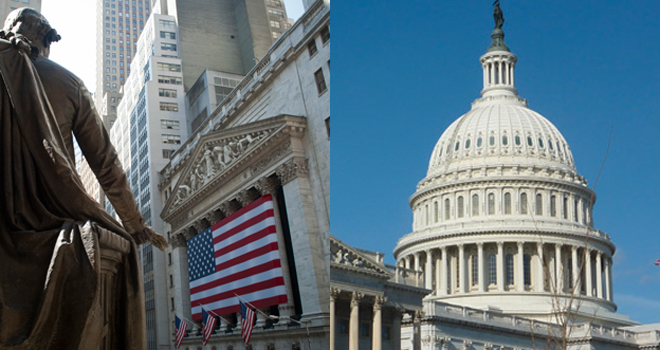Concerned by the recent rhetoric surrounding the debt limit debate, Fitch recently put out a memo threatening to downgrade the US government’s credit rating if Congress failed to reach a deal by August. Other ratings agencies have issued similarly dire warnings, including Moody’s, who said they may strip the US of its prized AAA bond rating by mid-July if the standoff hasn’t been resolved.
But ratings alone are relatively abstract. The real question is exactly how bad things would get in such a scenario. Experts who talked to TPM are divided on how much damage would remain after a brief default, but many are concerned that serious long-term consequences in the bond market are possible. If investors becomes spooked, they warn, interest rates on Treasury bonds could spike, a result that would drive up the deficit even further and put pressure on an already depressed housing market.
Because interest rates on bonds determine how much it costs the US government to secure more debt, even seemingly slight changes can affect the long term deficit on a large scale. A 1% rise in interest rates, or 100 basis points, would grow the deficit by over $400 billion over the next five years and $1.2 trillion from 2012-2021, according to the CBO. Given that the agency’s baseline assumes a number of tax cuts that Congress typically extends will expire, it’s likely that more debt would be affected and push the number even higher.
Bill Gross, the founder of bond giant PIMCO, told CBS in April that a debt ceiling default could prompt a “catastrophic” rise in interest rates perhaps even approaching that scale. “Global investors would move money at the margin to countries which have their act together,” he said. “Interest rates might rise by 50 basis points overnight, the stock market would plunge.”
The question then becomes whether things would ever be the same after such an event. Some observers suggest the bond market could return to normal quickly after the immediate crisis was resolved. After all, the US is not facing the same sovereign debt disaster that countries like Greece or Iceland have encountered; its own default would be self-imposed.
Mickey Levy, chief economist at Bank of America, told TPM that he doesn’t’ “see the long run implications” from a standoff. He compared the situation to the 1995-1996 government shutdown, which was fought over a debt limit increase but failed to derail the bond market. “It really didn’t have an impact,” he said.
According to Dean Baker of the Center for Economic Policy Research, it’s possible a brief “scare” in which the US quickly corrected itself after missing a payment could leave behind a lasting increase of only a few basis points, which he estimated would add less than $2 billion a year to the debt.
But others are much more concerned. Douglas Holtz-Eakin, a top Republican advisor and former CBO director, warned in a panel discussion this week that creditors would not be easily reassured after a default.
“The idea that somehow it’s a pro-growth strategy to raise interest rates on a permanent basis in the United States is just crazy,” he said. “We need to grow at this point more than anything else.”
Donald Marron, director of the Urban-Brookings Tax Policy Center, recalled in a recent blog post that the US accidentally defaulted once in 1979 and noted that interest rates on Treasury bills remained high even several months later. “Not surprisingly it shows that even temporary default is a bad idea,” he wrote.
This lack of a clear understanding of a default could make toying with the debt ceiling a dangerous affair, warns Rudy Penner, a former CBO director.
“It’s really the $64 trillion dollar question,” Penner told TPM in a phone interview. “Some people on Wall Street tell me there wouldn’t be much of a reaction because investors would see this as the usual silly Washington theater. On the other hand, you have Secretary Geithner saying it would be a total disaster and I’m not sure he’s wrong. It’s a very uncertain — and therefore very risky — situation.”
Nor would the problem be confined to US debt — a report by the left-leaning Center for American Progress suggests the damage to the housing market may be even more severe. According to their research, past shocks in the bond market have resulted in outsized increases in mortgage rates, which are based on treasury interest rates. They estimate that interest on home lands could rise 0.66% in response to 0.5% rise in interest on treasury bills as a result, which would depress home sales by discouraging buyers from taking on loans.
“If Congress fails to raise that ceiling then the U.S. housing market would most likely experience a severe double-dip contraction marked by much lower home sales and depressed house prices,” author Christian Weller wrote. “That in turn would spark a return of the economic pain of the past few years for many families as foreclosures would remain at or near record highs, and jobs in key sectors, such as construction, would disappear again.”
Republicans have argued that the debt ceiling fight is necessary to protect the economy from even greater shocks in the long run, and economists and investors agree that the US needs to get its deficit under control to avoid trouble down the line. President Obama has called for unspecified trillions in cuts as well, while disagreeing with the GOP’s approach on issues like taxes entitlements. A default, however brief, could make their tasks that much harder by derailing the recovery and potentially adding billions in additional debt.






